SUMMER OF STEM

Phoenix teen researches at Israel’s Weizmann Institute of Science

SENIOR LIFESTYLE
Domestic violence, Medicare homelessness and other issues affecting the aging.



Phoenix teen researches at Israel’s Weizmann Institute of Science

SENIOR LIFESTYLE
Domestic violence, Medicare homelessness and other issues affecting the aging.


 NICK ENQUIST | STAFF WRITER
NICK ENQUIST | STAFF WRITER
In January, the Jewish Community Relations Council of Greater Phoenix hired its new executive director, Paul Rockower. When he took the position, Rockower wanted the JCRC to be both a uniting force in the Valley’s Jewish community and an ambassador to other communities. Now, nine months in, he feels that the organization is closer to achieving those goals.
“We have been listening to our partners in the Jewish community and outside the Jewish community to figure out how we can build and strengthen Jewish community relations internally and externally,” Rockower said. “We are striving to create a more cohesive and collaborative Jewish community. Meanwhile, we are working to be present at the causes and events that matter to our partners in the broader community, and how to help them engage with programs in the Jewish community and the issues we face.”
Although not from Phoenix originally, Rockower has spent the last nine months learning about the local Jewish ecosystem. With a long career in public diplomacy, he had the necessary experience to leverage the Phoenix Jewish community’s “soft power,” as he wrote in an op-ed in these pages when he came onboard, and has consequently been working to identify community resources and institutional strengths.
“The more we can utilize our soft power to strengthen Phoenix civil society and our ties with it, the better off
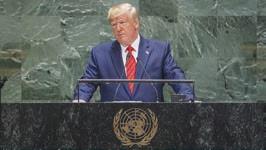
For nearly 10 years, the Phoenix division of PJ Library has brought books to families all across the Valley to help them build a personal Jewish library. Recently, the library just hit a new milestone by delivering its 150,000th book on Sept. 17.

The program director of PJ Library Greater Phoenix, Marcy Lewis, said it was an exciting achievement for the organization.
“It was such an inspiring moment knowing that we have sent out 150,000 books in 10 years for Jewish families all over Phoenix,” Lewis said. “When we hit that milestone, we delivered the book to Dr. Joshua and Leah Mondlick and their kids. We made a big event out of it with balloons and it was a lot of fun.”
The book, “Shai’s Shabbat Walk,” is a children’s picture book about a boy named Shai who celebrates
we will be,” Rockower said.
The JCRC’s recently elected board chair, Adam Goodman, appreciates Rockower’s attention to communal connection.
“At the JCRC, we believe that all work is done through relationships, so building relationships has been our focus,” Goodman said. “As the JCRC develops a rapport with other community organizations, we are learning about their priorities and how the JCRC can be supportive of their ambitions and needs.”
Goodman was elected chair in May; Dr. Erika Neuberg was elected as vice chair. Since then, the JCRC has been at the forefront of several events to promote dialogue between communities, including the Smart Justice Cafe and the interfaith concert “A Celebration of Spirit: Strengthening Our Common Bonds Through Music and Faith.”
The concert, which took place in June, served to build bridges between the Phoenix area’s Jewish and AfricanAmerican communities through gospel and Jewish liturgical music. The Arizona Jewish Historical Society and Pilgrim Rest Baptist Church — where the concert was held — co-sponsored the interfaith concert.
September’s Smart Justice Cafe was a collaborative effort between the JCRC,
community about America’s criminal justice system. The event focused on examining prison reform through a Jewish lens and brought in a few Phoenix residents whose lives had been directly affected by the prison system.

Such events promote mutually supportive relationships between Jewish and non-Jewish communities.
“When events affect their communities,
January 4
January 11
January 18
January 25
February 1
February 8
February 15
February 22
March 1
March 15
March 29
June 7
June 21
August 9
August 30*
September 6
September 13
September 20
September 27
October 4
October 18
November 1
“The immediate future will keep us focused on deepening relationships in faith and ethnic communities, building a network of media contacts and establishing a presence with civic leaders in municipal, state and federal government,” Goodman said. “In the long term, we can seek to create a civil, respectful and inclusive community that is free from anti-Semitism.” JN
April 5
April 12
April 19
May 3
May 17
May 31
November 15
December 6
December 13
December 20
*Annual Directory
PUBLISHER | Jewish Community Foundation of Greater Phoenix





EDITORIAL DIRECTOR | Liz Spikol
MANAGING EDITOR | Rich Solomon
STAFF WRITER | Nick Enquist
CONTRIBUTORS | Joel Zolondek
ADVERTISING SALES CONSULTANTS | Jodi Lipson
CIRCULATION | Bill Sims
GRAPHIC DESIGNER | Frank Wagner
CONTINUED FROM PAGE 1
Shabbat by going for a walk. Overall, Phoenix’s PJ Library has delivered books to 3,553 families since it started. It currently delivers books to 1,780 families in the Greater Phoenix area.
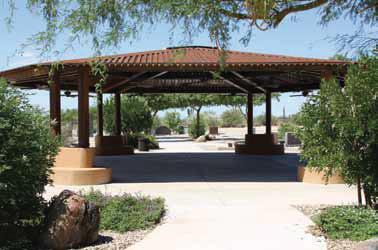
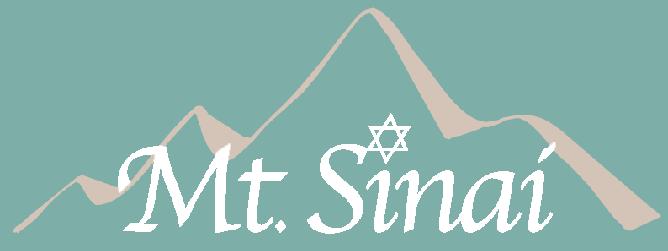
Children between the ages of 6 months to 8 years can receive books through the library. Although 8 is technically the cutoff age, PJ Library began PJ Our Way for children 9 to 11 to continue to receive free stories.
PJ Library is a project of the Massachusetts-based Harold Grinspoon Foundation. Originally serving Western Massachusetts only, it was created in December 2005 as a Jewish engagement and literacy program for Jewish and interfaith families with young children. Harold Grinspoon started it so that every Jewish family could have a Jewish library.
Today, PJ Library delivers more than 200,000 free Jewish children’s books and CDs each month to families across the United States and Canada. In total, the literacy program has delivered more than 12 million books.
“Every book comes with these two flaps, and when you open up the book, the inside flap will tell you how this book is Jewish,” Lewis said. “Then the back will tell you how you can incorporate this book into your everyday life.”
The book doesn’t have to be explicitly Jewish, she said. It could even be a Dr. Seuss book that relates to specific Jewish values.
The service is free for families who sign up and is financially supported by the Harold Grinspoon Foundation, as well as other donors.
Delivering 150,000 books and opening the new PJ Our Way chapter are just some of the new milestones for the Phoenix chapter.
In honor of Harold Grinspoon’s 90th birthday, and in recognition of the success PJ Library had in Phoenix, the chapter launched an endowment campaign in partnership with the Jewish Community Foundation of Greater Phoenix and the Harold Grinspoon Foundation.
“From PJ Library’s beginnings, we have been consistently impressed by the breadth and depth of its success,” JCF President and CEO Richard Kasper said. “Any tool that helps families create Jewish homes is important, but PJ Library has been particularly good at connecting intermarried and unaffiliated families to Jewish life and to the Jewish community.”
The inaugural donors for this new endowment were Phoenix residents Barbara and Barry Zemel. With this endowment, the local chapter will have the funds to self-sustain and won’t need to rely on fundraisers for future programming. Along with the endowment, PJ Library also received additional funding from donors Marilyn Einstein and Steve Sim to hire two full-time ambassadors.
In 2016, the Phoenix chapter received the PJ Library Implementing Partner Engagement Grant from the Harold Grinspoon Foundation. That grant funded three ambassadors for two years, allowing the library to increase outreach efforts in the East Valley and Central Phoenix neighborhoods.
Lewis said that this time the library chose to focus on the East Valley and West Valley areas because there many Jewish families living in those neighborhoods. Returning ambassador Maureen Brish will serve the East Valley and new hire Meghan Newman-Davies will serve the West Valley.
The ambassador’s job is to help families create meaningful connections with one another in their own neighborhoods. The ambassador focuses on their specific community and tries to have a more personal touch when creating events for families, according to Lewis.
“They’re not supposed to be making these big programs. It’s supposed to be about getting to know the people in the neighborhood,” Lewis said. “So maybe one of them will take a mom out for coffee who just moved into town, for example.”
PJ Library has connected with the community more through a new social media reading hour campaign. Since early summer, PJ Library has had one Jewish community leader read a storybook every Friday through Facebook’s livestreaming program.
“I just thought that it would be neat to have all these Jewish leaders read stories every week, so I put together a signup sheet,” Lewis said. “I did it from mid-August to the end of September, and within an hour every single slot was filled up.”
Readers have included the president and CEO of the Jewish Federation of Greater Phoenix, Marty Haberer; the executive director of the Minkoff Center for Jewish Genetics, Wendy Carriere; and Temple Chai Rabbi Bonnie Koppell.
Lewis said that the response to the read-along has been incredible and she didn’t expect to get so many volunteers so quickly. The library has readers scheduled till March 2020. JN

After his senior year of high school, Kyle Polen could have used his summer to take a well-earned break before starting his first semester at Arizona State University. But Polen decided instead to study at the Weizmann Institute of Science in Rehovot, Israel.
Polen, 19, joined the institute’s Dr. Bessie F. Lawrence International Summer Science Institute program, which takes in 80 high school graduates from around the world to experience scientific research firsthand.
“It was a program that I applied for in December of last year and I was fortunate enough to be one of the representatives from the United States,” Polen said. “I really developed a passion for scientific research later in high school. It was an incredible learning experience for me.”
However, its prestige wasn’t the only reason Polen found himself drawn to study at the institute. He had been to Israel once before during a summer trip through Camp Stein and he was hoping to go back. Even though this wasn’t specifically a Jewish program, he found it a great way to combine two of his passions.

And his previous experience in the country allowed him to help his fellow students experience the Jewish state better.

“Most of the students at the Weizmann Institute were not Jewish and I kind of felt like a representative, in a way, having been to Israel already,” Polen said. “They’re memories that I look back on very fondly, I got to experience Israel a second time while all these students got to see it for the first time.”
The summer science program offers students training in subjects like biology, chemistry, physics and computer science. It also gives students the chance to use sophisticated lab equipment such as electron microscopes, advanced computers, a highenergy particle accelerator and lasers.
The month-long program started in 1969 and has been going on consistently since then.
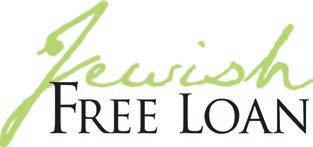

Polen said he always clicked with technology, science and math in the classroom, but his passion for those subjects grew when he started volunteering at a hospital and got hands-on research experience.
When he initially arrived at the institute,
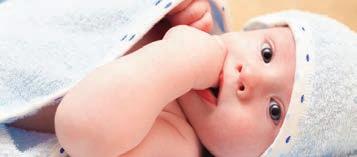


Polen was open to any subject of research work he could be a part of, and that flexible mindset brought him to study a subject that he had never considered before.
“My research focused specifically on immunology in a lab group of four people with a mentor,” Polen said. “It was focused on multiple sclerosis treatments on a small, cellular level. We were working with human blood and cells to apply a treatment that we had seen work for mice.”
Polen said that the opportunity to learn about immunology — the study of the immune system — expanded his understanding about medicine. At ASU he is studying biochemistry in the life sciences program. His focus is on pre-medical sciences because he wants to become a physician.
Before attending ASU, he studied at Chaparral High School and was one of 20 Arizona students selected as a Flinn Scholar. The scholarship gives students a full ride to any state college.

He received the call from the Flinn Foundation while he was brushing his teeth in Switzerland on a travel abroad program. Polen admits that it was all a hectic time for him, but it was also an incredible experience.
“I think being able to have that work ethic and understanding helped me make it through those difficult application processes and help me get to where I want to be,” Polen said.
A member of Congregation Beth Israel, Polen said that many of his opportunities came from being so involved with the Jewish community. Having that community to rely on and the same friends from his Sunday school and camp have always provided him great motivation to continue forward.
Attending the Weizmann Institute was an experience he thought could not have happened without the support of the Jewish community.
“I really was not expecting to get it, because like I said, I didn’t have as much research experience before,” Polen said. “But, I think it’s important not to get discouraged. But, I knew that this was too important, and even though I didn’t think that I had a great chance, I still applied myself and it worked out in the end. I’m so grateful that it did.”
Female Air Force pilot takes command of Israel flight squadron for first time
The Israel Air Force Nachshon squadron is now being led by a female — the first time in the nation’s history, The Jerusalem Post reported.
“Congratulations to our first female commander of an operational squadron in the Air Force — we’ve been waiting for you for 71 years,” IAF Cmdr. Maj.-Gen. Amikam Norkin said at the ceremony on Sept. 24. “Lt. Col. G, the mother of two boys, you are a role model and an inspiration for thousands of women in the state of Israel.”
The pilot — whose full name was withheld because of security reasons — commands an intelligence unit based in the southern Nevatim Airbase. She was conscripted in 2003, serving in the 131st and 135st squadron after completing the pilots’ course. Later, she was deputy commander of the Nachshon squadron from 2014 to 2017.


Gandhi’s 1939 Rosh Hashanah greeting found


A Rosh Hashanah greeting Mahatma Gandhi wrote on Sept. 1, 1939 — the day the Nazis invaded Poland — was found at
the National Library of Israel, The Jerusalem Post reported.

“Dear Shohet, You have my good wishes for your new year,” the letter to A.E. Shohet, who headed the Bombay Zionist Association, reads. “How I wish the new year may mean an era of peace for your afflicted people.”

The library discovered the greeting as part of an initiative to receive millions of items in its archives. It placed the letter online this week.
Shohet, who was an Indian Jew from Bombay, had interviewed Gandhi in March of 1939.
Israeli hunting documentary “Trophy” won an Emmy for Outstanding Nature Documentary at the 2019 News and Documentary Emmys announced Sept. 24 in New York City, The Jerusalem Post reported.




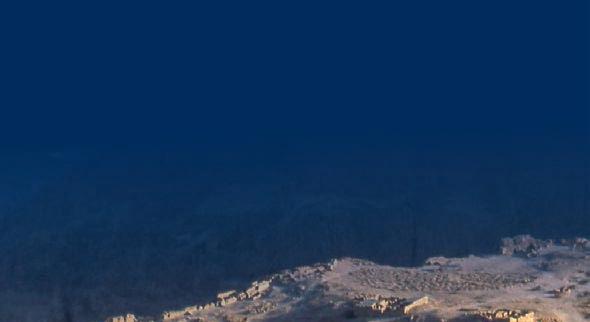


Trophy was directed by Shaul Schwarz with Christina Clusiau. Israeli cable network YES Docu produced the documentary and it was distributed by CNN. Alon Schwarz, who is Shaul Schwarz’s brother, co-produced it, and it was edited by Halil Efrat.
The movie takes a look at exotic animal hunting — with customers spending large
sums to bolster private collections with trophies made from zebras, lions and rhinos. It also discusses the controversial topic of whether the industry’s existence is helpful in the survival of endangered species. JN
Prosecutors said they will ask for probation for Matthew James Amiot, 36, a homeless man who pleaded guilty to burning down a Duluth, Minnesota, synagogue on Sept. 9, JTA reported.
Amiot could have faced up to three years in prison for the fire at 120-year-old Adas Israel Synagogue, but police said there was no evidence the fire was a bias or hate crime.
Amiot said he was taking shelter in an alcove between the synagogue and its sukkah when he used a lighter to set a fire. He said he tried to extinguish the fire by spitting on it, but walked away when that failed.
Damage to the property, which was declared a total loss, was $117,000 for the building and at least $250,000 for religious items.
New Jersey attorney resigns after ‘Jew down’ controversy
Stuart Platt, an attorney under contract with the city of Trenton, New Jersey, resigned in the wake of a September executive session during which City Council President Kathy McBride used the term “Jew her down,” JTA reported.
Platt is relinquishing a $25,000 contract to be the city’s redevelopment attorney.
“I am an American and I am a Jew. I am resigning because of the disgraceful and shameful anti-Semitic remarks that were in fact made by the Council president of the city of Trenton, Kathy McBride,” Platt wrote in his resignation letter. “The vitriolic and hateful anti-Semitic comments were exacerbated by Councilwoman Robin Vaughn, who defended McBride by saying that the word ‘Jew’ is a verb and then claiming not to know this is an antiSemitic slur.”
McBride and Council members George Muschal and Vaughn — who both originally defended McBride — have since apologized. JN
Like any American high-schooler, Riva Weiss started the school year off with a flurry of activity, albeit with a new development she has been mulling over since late spring. That’s the start of the Association of Jewish Students, a Jewish club at Niles North High School in Skokie, Illinois, with its goal of educating fellow students about holidays, traditions and history. The first meeting took place on Sept. 19.
An Israeli club has already been active there, as Skokie has long had a significant Jewish population. At its peak in the mid1960s, nearly 60% of its population was Jewish — the largest percentage of any Chicago suburb. In fact, it garnered international attention for a 1977 court case dealing with freedom of speech and freedom of assembly, National Socialist Party of America v. Village of Skokie, protesting a planned march by neo-Nazis in an area home to numerous Holocaust survivors. For a number of reasons, the march never did take place there; it was held in nearby Chicago instead, though it made Skokie a household name among Jews across the country.
Weiss, 15, knows the story well, and it prompted her and other Jewish teenagers to begin the new club after what they felt was another scare back in May. The school district had listed an optional educator’s training course called “Teaching Palestine,” with content that became an immediate cause for concern.
Objectives of the course, according to printed materials, include a focus on the political context of the Israeli “occupation” of “Palestine” and the Palestinian liberation struggle; strategies on how to respond to Zionist curricula, or when parents/staff/ others object to anti-Zionist curriculum; and connections between “Palestine” and issues affecting students, such as state/police violence, the struggle for racial justice in America, settler colonialism in “Palestine” and the United States, and access to education for historically marginalized youth.
“I was very upset,” said the 10th-grader about hearing the news. “My religion matters a lot to me. I am a Jew, and I’m proud; my home and school are the two most important things to me.”
(A direct reminder of Jewish heritage is the Illinois Holocaust Museum and Education Center, across the expressway and just minutes from Niles North.)
She and about a dozen other students met at their CTeen (Chabad Teen Network) chapter, led by Rabbi Yochanan Posner, to talk over issues and feelings the course engendered. At about the same time, the pro-Israel advocacy group StandWithUs, invited to the meeting by the rabbi, sent out an Action Alert that galvanized an instant response from the local community. In short form, the district retracted the class from its list of offerings with apologies for not realizing “the one-sided nature” of a course, it stated, that “addresses a very complex topic.”
“When it was removed, I literally jumped up and down,” recalled Weiss. “I definitely felt empowered. It can be hard to be open about your religion in a public school, but I don’t want to be afraid; I want to show who I am. I grew from this.”
Jac Copeland, also in 10th grade at Niles North and who is helping to form the Jewish club, was likewise in disbelief at first. “I thought, hasn’t Skokie been here before? Haven’t others learned from their mistakes?”
He said that even after the quick action of the school district and the removal of the course, “the fact that it happened, we weren’t going to let it slide. We had another meeting on what teens can do, where to go from here, and we decided on the club. It’s for Jews and non-Jews, so we can share information and promote education about Judaism, and get to know each other more.”
Weiss and Copeland are also involved with the Israeli club, which focuses more on the culture of the Jewish state.
“We realized,” said Copeland, also 15, “that a lot of kids don’t know much about Judaism and the issues we face as Jews, particularly in this polarized environment of ‘I’m right and you’re wrong.’ We can’t just push each other away; we have to open access for learning. And we need to present facts without biases.”
Next on tap for the Association of Jewish Students is putting up a sukkah, where students of all backgrounds can sit and eat; holding a Chanukah menorah-lighting and latke party; hosting a mock seder during
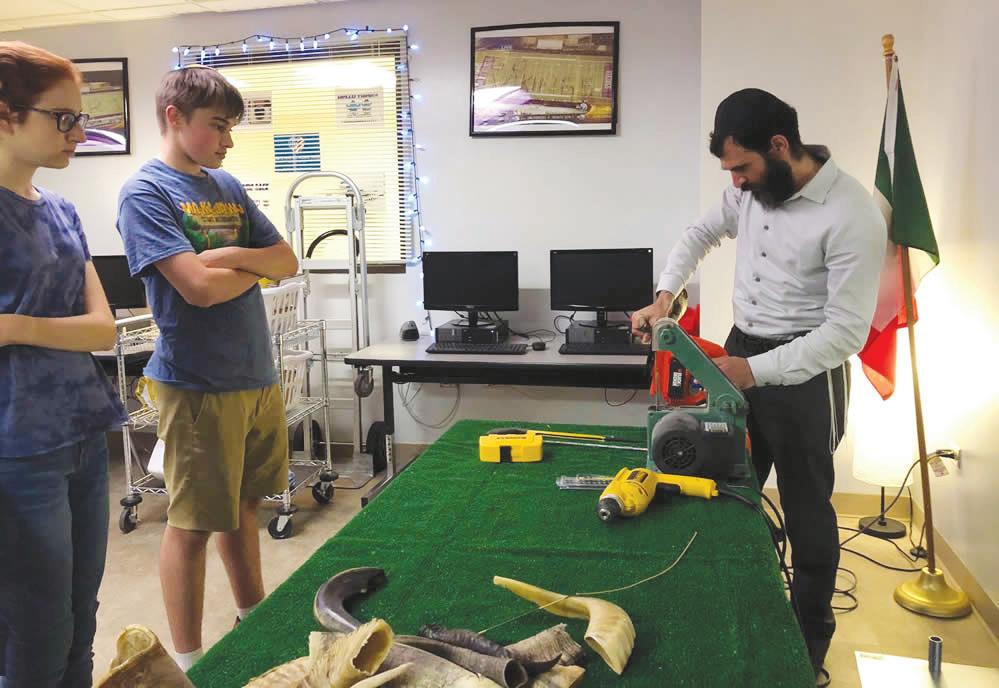

Passover time; and offering opportunities to introduce traditional Jewish foods throughout the year. As far as the Israeli club goes (it is affiliated with NSCY, a Jewish youth group under the auspices of the Orthodox Union, and sponsored at the high school by Anna Raiber), it offers folk-dancing, the celebration of Israeli-specific holidays and will be putting on a musical.
‘What to expect after high school’ Posner, director of the Skokie CTeen chapter, said the energy of the students is telling; that they were the ones behind the launching of the new club, and he is there to support them.
“There are strong feelings out there,” he said. “They have ideas, insight, sophisticated opinions — and they can make a difference. Don’t ever underestimate the power of young people.”
He believes that the school district consists of “good people who are not anti-Semitic or anti-Israel; they simply didn’t understand the nuances of the course” or the consternation it would engender. Posner credits the school district for working quickly and decisively to correct what he feels was “an innocent mistake.”
What he can do as a religious adviser, he explained, is “to give students the knowledge and the tools to expose their Jewishness in a positive way,” and what the teens can do together at school is “to educate nonJewish students and teachers about Judaism. Through familiarizing them with who we are, we hope to reduce anti-Semitism.”
‘The
teens
CARIN M. SMILK | JNS.ORGStudents from Niles North High School in Skokie, Illinois., meet as part of a newly created club, the Association of Jewish Students. At right is special-education teacher Dr. Anne Zavell, the club sponsor. PHOTO COURTESY OF CTEEN VIA JNS.ORG Rabbi Yochanan Posner, director of the Skokie CTeen chapter, helps students make a shofar from scratch at the first meeting of the Association of Jewish Students. PHOTO COURTESY OF CTEEN VIA JNS.ORG
He is being assisted on the school premises by special-education teacher Dr. Anne Zavell, the club sponsor. She has taught for 33 years — 26 of them at Niles North. Zavell notes that the population of both the community and the school has changed over the decades; that back in the 1980s (when her husband attended), it was actually known as “a Jewish school.”
Now, with a mix of different ethnicities, including a sizeable Muslim population, a need has arisen, she adds, for cultural information — for more information, period.
So when the teens came to her for support, she said, “I couldn’t say ‘no’ to them. I was happy to help.”


At that first meeting on Sept. 19, participants handmade a shofar with equipment the rabbi brought in, and tasted different types of apples and honey — timed to the upcoming High Holidays — and discussed the goals of the new club to be and how similar issues can be addressed in the future. They also handed out food to curious students who wandered in from the hallway, putting words into action by being welcoming and inclusive.
“I think the kids are very brave to show they are Jewish, to be so visible — not
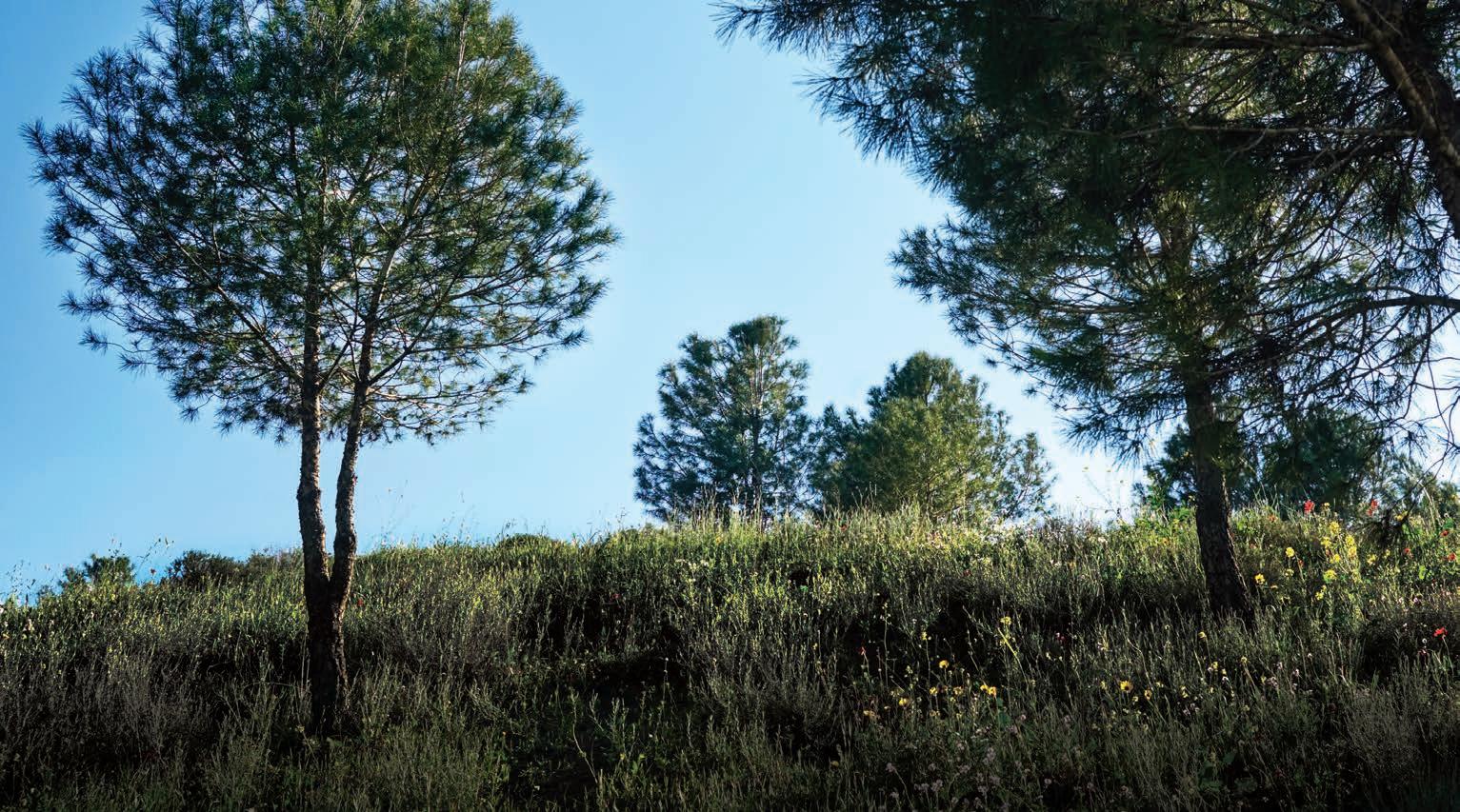
hiding their identities and wanting others to understand them. It also gives them an understanding of what to expect after high school,” said Zavell, when they leave the so-called “bubble” of their community and of Chicago-area Jewish resources.
Such resources include the pro-Israel advocacy group StandWithUs, which was present at the first general meeting of students on May 31, along with the Simon Wiesenthal Center.


‘What we do is educate’
Midwest managing director Assaf Grumberg explained that the issue with the course in question, like other Palestinianrelated curriculums circulating through the United States, has to do with legitimate criticism of Israel and its policies versus anti-Semitism and hatred of Jews.
“There are stronger and stronger attempts to delegitimize the State of Israel,” he said. “There is increasingly venomous anti-Semitic content that is easier to recognize,” at least, for those familiar with the material.
The teacher’s course “was not factual,” said Grumberg. “The community at large protested it; they would not accept anti-Semitism as fact.”

The problem, he explained, is that in places where such courses do get successfully taught, any misinformation will inevitably go from teacher to student eventually.
While in Skokie the decision was reversed the same day, said Grumberg, that’s not often the case. He noted that adults often can’t recognize biases when it pertains to the kinds of text in question, which become more nuanced and more difficult to identify an underlying agenda, and that’s why his organization is there: “What we do is educate.”
As for the teens, he said they should feel confident and know that support is out there.
“Do not stay silent,” he advised. “Do not be afraid to speak out. We have your back. We have the tools and resources to identify forms of anti-Semitism, and to educate communities.”
Of this particular group of students, he pointed out that what happened in Skokie represents “the core of activism.”
“These are the students you’re always looking for,” said Grumberg. “These are leaders. These are the people who say, Hineni: We are here.” JN
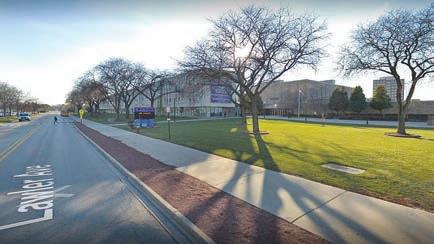
Last last month, the United Nations issued a report on anti-Semitism that was characterized in the press as “unprecedented.” Titled “Combatting Antisemitism to Eliminate Discrimination and Intolerance Based on Religion or Belief,” the report was authored by Ahmed Shaheed, U.N. Special Rapporteur on Freedom of Religion or Belief. Shaheed ominously warned that anti-Semitism is on the rise around the world, “increasing in magnitude in several countries,” and noted that the hatred comes from right and left, white supremacists and Islamists, and is prevalent online.
None of Shaheed’s findings are particularly surprising, as our community already knows well that anti-Semitism is widespread and growing. But the report did hit some unexpected notes, including the fact that anti-Semitic attitudes are common even in countries with few Jewish people, or even no Jews at all.
The report urged U.N. member states to adopt the International Holocaust Remembrance Alliance’s working definition of anti-Semitism: “a
certain perception of Jews, which may be expressed as hatred toward Jews. Rhetorical and physical manifestations of anti-Semitism are directed toward Jewish or non-Jewish individuals and/or their property, toward Jewish community institutions and religious facilities.”
stereotypes, rejects the right of Israel to exist or advocates discrimination against Jewish individuals because of their religion should be condemned.” And the report expressed support for boycotts, saying, “international law recognizes boycotts as constituting legitimate
the BDS movement encourages antiSemitism, even though the report said no such thing. Instead, the report merely acknowledged that there are those who view “the objectives, activities and effects of the Boycott Divestment Sanctions (BDS) movement [to be] fundamentally anti-Semitic,” but added that “these allegations are rejected by the BDS movement.”
Even with its limitations, however, the report is welcome recognition from a world body that has, until now, buried its head in the sand on issues relating to Israel, and by extension, world Jewry. Now, through the report, the U.N. has recognized, acknowledged and provided some guidance regarding the very real threat of anti-Semitism for all of its member nations, and that is significant.
Based upon that language, it would have made sense for the report to label the boycott, divestment and sanctions movement against Israel as anti-Semitic. But it didn’t quite say that. Instead, the report voiced criticism of BDS proponents, noting that “expression which draws upon anti-Semitic tropes or
With its win of 13 Knesset seats, the Arab-led Joint List doubled its size in September’s parliamentary election and became Israel’s third largest party. This represents a significant breakthrough for Israel’s 2 millionstrong Arab minority, and could presage the blossoming of a new 21st-century identity for Israeli Arabs.
Arab parties have never been invited to join an Israeli ruling coalition. And if Prime Minister Benjamin Netanyahu is successful in cobbling together a 61-member governing coalition, it won’t happen this year, either. But it is clear that something has changed, and that Arab Israelis are starting to engage more fully in the electoral process, and their elected representatives are feeling empowered to start flexing some political muscle.
September’s do-over election focused heavily on the role and future of Netanyahu — an Arab community antagonist — and offered Israel’s Arabs
a possible role in effecting change. In response, Arab parties put aside enough of their differences to bring the Joint List back together, and to lead the surge in Arab turnout to vote for them, and against the continuing Netanyahu
forms of political expression, and that nonviolent expressions of support for boycotts are, as a general matter, legitimate speech that should be protected.”
If you find the report’s logic a bit confusing, you’re not alone. Israel’s ambassador to the U.N., Danny Danon, praised the report’s determination that
It will take a concerted effort to get governments of the world — democracies and autocracies alike — to take the issue of anti-Semitism seriously, and to do something about it. But this is a start. Jewish communities and organizations, and Israel, must figure out a way to be international partners in that work. JN
occurred, and more is likely to come. Indeed, a recent poll found that 65% of Arab citizens are proud to be Israeli, and 76% of Israeli Arabs favor the Arab parties joining the government.
In light of those developments, many
Maariv. And since no Arab party had participated in the recommendation process since the 1980s, “this endorsement marks a historic move by the Arab Knesset members toward their voters: integration, coexistence and influence.”
That doesn’t mean that Israel’s Arabs embrace the notion of Israel as the nation state of the Jews. They largely don’t. But the non-Zionist haredi parties have long sat in the government, and that involvement sets a good precedent for the Israeli Arabs.
threat. Now, with its newfound prominence, the Joint List could become the leader of the opposition to a national unity government it will not join.
But where would the Arab parties fit? And can they play a constructive role in the next Knesset? We’re not sure. But it does seem clear that some change has
Israeli commentators saw the Joint List’s public endorsement of Blue and White’s Benny Gantz for prime minister as a watershed event. “The endorsement by the Joint Arab List of a Zionist party to form a government in Israel is a historic, formative and exciting event,” Ben Caspit wrote in
For now, President Reuven Rivlin has turned to Netanyahu, not Gantz, to try to form a government. As that process unfolds, Arab Israelis, like the rest of us, will wait to see what happens. In the meantime, as Israel’s Arab parties focus on possible further integration into the political process and work to identify a meaningful role in the coming Knesset, Israel’s Arab citizens can dream about a new beginning and expanded opportunities. JN
'THE ENDORSEMENT BY THE JOINT ARAB LIST OF A ZIONIST PARTY TO FORM A GOVERNMENT IN ISRAEL IS A HISTORIC, FORMATIVE AND EXCITING EVENT.' BEN CASPIT, MAARIV
THE REPORT IS WELCOME RECOGNITION FROM A WORLD BODY THAT HAS, UNTIL NOW, BURIED ITS HEAD IN THE SAND ON ISSUES RELATING TO ISRAEL, AND BY EXTENSION, WORLD JEWRY.
Approached by reporters on the tarmac of a California airport as the tally from the Sept. 17 Knesset elections was still being calculated, U.S. President Donald Trump measured his words.
When asked whether he had spoken to Israeli Prime Minister Benjamin Netanyahu — whose political future appeared to be hanging in the balance of what was clearly leading to the current deadlock — Trump replied: “I have not. Those results are coming in, and it’s very close. Do you have any updates? You people (the press) usually should know before the president, right?”
Indicating that he was not surprised by the turn of events, Trump added, “Everybody knew it was going to be very close. We’ll see what happens.”
Grasping the point of the question, which had to do with his much-touted close personal bond with Netanyahu, he concluded by saying, “Look, our relationship is with Israel.”
It was like a shot that could be heard around the world. Journalists known for their hostility to both leaders gleefully described Trump as a man giving his Israeli counterpart the cold shoulder. In Israel, much ink and airtime have been devoted to the so-called “end of the bromance.”
The unveiled schadenfreude exhibited by two of Channel 12’s prominent female anchors was especially jaw-dropping. In the first place, it took the form of feigned empathy. Secondly, it sounded like a couple of besties gossiping at a cafe, rather than a professional power duo providing post-election analysis. The girl-talk went something like this:
Anchor 1: “Do you think that Netanyahu’s feelings are hurt by Trump?”
Anchor 2: “No, Netanyahu doesn’t operate on that level the way that you and I do.”
Anchor 1: “Well, I certainly would be hurt. In fact, I’m insulted on Netanyahu’s behalf.”
Now, there’s a hoot, coming from
MIKHAL WEINER
On Aug. 28, Greta Thunberg, the teen Swedish climate activist, climbed off her zero-emissions boat with a glint in her eye. She had traveled across the world to deliver a message to the UN General Assembly. Her journey had led her to speak in, arguably, the most consequential hall in the world, to address those with the most power to enact change.
“People are suffering, people are dying,” she asserted, “and our ecosystems are collapsing ... and all you can talk about is the money and fairytales of eternal economic growth.”
Many have written about Thunberg’s eloquence and determination. Many others have questioned her influence, pointing to her youth as evidence of her potential naivete. She is a puzzling character, at once galvanizing and infuriating. It all depends how you feel about climate change and ecological activism.
Listening to her fiery speech brought to mind another nautical messenger traveling across his known world to call a populace to repent before destruction should befall them. I am, of course, relating to the prophet Jonah, whose story of reluctant prophecy and angst we will
someone who has been bent on seeing him defeated.
Perhaps not surprisingly, the most newsworthy element of Trump’s remark — that his administration’s pro-Israel stance is intact and will not change, no matter who ends up at the helm in Jerusalem — is being overlooked, if not twisted to sound like some kind of a betrayal.
In fact, his words should be cause for praise, not scorn. Furthermore, imagine the mincemeat that would be made of him today had he phoned Netanyahu before waiting until the identity of the next Israeli premier was established.
Though the Trump-Netanyahu “bromance” undoubtedly involves no small degree of mutual admiration, it was sparked and continues to be based on the shared interests of America and Israel.
In a Jerusalem Post interview in February 2009 — less than a month into the new administration of U.S. President Barack Obama, and about a week before Netanyahu became Israel’s prime minister
SEE BLUM, PAGE 12
lands and travel over dangerous waters, to encounter unknown perils, in order to relay their message to those with the power to make change. They both had to find within themselves the faith in the truth of their message in order to relay it with the appropriate fervor.
We have been subscribers to your publication for some period of time.
With reference to the Sept. 13 publication of the book reviews “Dershowitz, Gordis on the U.S.-Israel relationship” by Jesse Bernstein, we offer the following advice. A book review section should never be an editorial statement and certainly this book review seemed to be a “Never Trump” editorial, timed exactly for Rep. Nadler’s proceeding for the impeachment of the president.
The character assasination of Alan Dershowitz by Bernstein seems to be the result of Dershowitz’s August 2018 book, “The Case Against Impeaching Trump.”
A suggestion is that a publication that represents the Phoenix Jewish community would be well served by returning to the principles of independent journalism and reserving opinions for the editorial section. Perhaps next time for a book review you should select a journalist from the Arizona State University Walter Cronkite School of Journalism and Mass Communication to provide an objective, independent review of these critically important books regarding our future relationship with Israel. Dorothy and Bud Hockenberg Des Moines, Iowa, and Phoenix, Arizona
saved. The king goes so far as to declare a nationwide fast and a time of repentance and prayer. He calls upon his people to heed the word of this prophet. To return from their evil ways because “who knoweth if God will not ... turn away from his fierce anger, that we perish not?” (Jonah 3:9). The king saw that even if the chance for redemption is slim, his role is to lead his people towards safety, to heed the words of this unlikely prophet.
chant in synagogues the world over on Yom Kippur.
Jonah and Greta have a lot in common. They both felt a call to service — Greta in the form of a sense of personal responsibility and dread, Jonah in the form of the “word of the Lord” (Jonah 1:1). They both had to leave behind their native
We all know how Jonah’s story ends. After a turbulent sea passage and a few days inside a “great fish,” he makes it to Nineveh and warns the people of their impending doom. Time is running out, he tells them: “Yet forty days and Nineveh shall be overthrown” (Jonah 3:4).
The people of Nineveh listen and are
The parallel between Jonah and Greta strikes me as particularly troubling. Especially when I see how Thunberg’s message has been received by the powerful men and women at the UN and by the general public. Not well, to say the least. Although millions gathered around the world to support her in a Climate Strike, I haven’t seen or heard anything about policy changes or even commitments to make such changes. The Amazon is still on fire. EPA regulations continue to be
SEE WEINER, PAGE 12
JONAH AND GRETA HAVE A LOT IN COMMON. THEY BOTH FELT A CALL TO SERVICE — GRETA IN THE FORM OF A SENSE OF PERSONAL RESPONSIBILITY AND DREAD, JONAH IN THE FORM OF 'THE WORD OF THE LORD.'
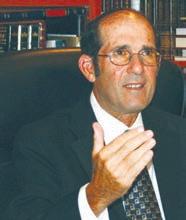
This week’s parsha, Vayelech, describes the end of an era, the termination of Moshe Rabbeinu’s leadership. Transferring power from one leader to the next is always fraught with dangers, especially during a crucial point in the life of the nation.
The Jews’ challenge at this time was to fight the wars to conquer Eretz Yisrael and settle it. This assignment had been too daunting for the previous generation, which had succumbed to the panic induced by the spies. That transgression was so serious that G-d threatened to destroy the Jewish people and refrained only because of Moshe’s prayerful intervention.
Forty years after the Exodus, the nation was poised to initiate the invasion. It would seem that Moshe’s leadership was needed more than ever, and that Hashem would allow him to stay in his position a bit longer to properly
CONTINUED FROM PAGE 11
for a second time, following a decade-long hiatus — Elliott Abrams talked about this very question of relations between heads of state.
Abrams, who had just completed serving two terms as a special assistant to former U.S. President George W. Bush (the second of which as deputy national security adviser for global democracy strategy) said that chemistry “matters, but its importance can be exaggerated.”
He continued: “To be sure, it makes it a lot easier when people at the top have a good relationship. But it doesn’t really affect policy, which is determined on the basis of national interest. We’re talking about democracies, for the most part … which have processes involving different branches of government or parliaments, as well as a whole slew of career diplomats and so on. So, it’s never simply a one-onone relationship. Where the relationship does matter is in how work gets done. It makes it very hard if the people at the top mistrust each other.”
execute this monumental task. However, we cannot comprehend Hashem’s considerations . He decreed that Moshe would not “cross over this Jordan,” but would ascend a hill to view the land from afar. Later he would climb Mount Nevo, where he would die and be interred in an unknown location.
The one who had led the Jews out of Egypt, brought the Torah down from Mount Sinai and guided them through the travails in the wilderness would not be with them for the final stage of their divine mission, to establish a holy nation in G-d’s Chosen Land.
What lessons can we learn from this? Much of Vayelech deals with how the leadership was transferred to Yehoshua. Hashem and Moshe encouraged him to be strong in carrying out his responsibilities.
Yehoshua’s situation was difficult. As a dedicated student of Moshe since youth, he had extreme reverence for his great master and teacher concerning whom the Torah attests, “there would never arise another Prophet like Moshe.” Yet, he was now summoned to assume the position of this seemingly irreplaceable personality.
This narrative depicts Moshe’s true greatness. A leader’s integrity is measured by his dedication to the people’s welfare. When things are going well, he will be popular. But what happens when society’s needs conflict with the leader’s personal desires?
This was precisely Moshe’s situation. He was forced to relinquish his position on the verge of achieving the ultimate success. And he alone could successfully transfer his power and provide the necessary legitimacy and self-confidence to someone who had been his student.
Moshe’s final challenge was to convince Yehoshua that his ascension was not a usurpation but, indeed, was a source of joy to him. He assured Yehoshua that, by scrupulously adhering to the commandments, he would be successful. Moshe urged him to “be strong and courageous.” At first glance, these words seem repetitive, but they are not.
A leader must be strong in two ways. First, he must be fully in control of his own emotions and absolutely dedicated to fulfilling both the letter and philosophy of the Torah. He must also be powerful in dealing with the pressure of people who
WEINER
CONTINUED FROM PAGE 11
Abrams may not have realized how prescient these words would turn out to be, given the strained relationship between Obama and Netanyahu that would last for eight years.
But this was not simply an issue of clashing personalities. On the contrary, it was due directly to Obama’s stated aim of putting “daylight” between Washington and Jerusalem. In other words, it was an ideological and political rift — an American president’s rejection of Israel, not its specific leader.
This is not to say that Trump and Netanyahu don’t enjoy genuine camaraderie. But Trump’s signaling that he will not abandon Israel — even if Netanyahu’s key rival, Blue and White Party chair Benny Gantz, becomes the guy leading the Jewish state — is good news, not a sign of a bad “bromance” breakup. JN
cut. In a particularly absurd moment, the state of California recently filed suit against the federal government to demand the right to be more stringent about car emissions.
The 10 days of awe between Rosh Hashanah and Yom Kippur present us with an opportunity to take stock of our deeds and to find the places in our lives that need fixing. We do this by partaking in teshuvah, from the Hebrew root that means “to return.” This is the act of recognizing our misdeeds and finding our way back to the path of righteousness. On Yom Kippur we’ll recite tens of categories of misdeeds during the prayer entitled “Vidui” (confession). These are usually broken down into categories; misdeeds against God versus misdeeds against other people. Sins of action versus sins of inaction. It seems to me that ecological wrongdoing falls into all four of those categories.
Let’s use this season of atonement to take stock of what we as individuals and
push him to act in ways that are contrary to Torah or to their own wellbeing.
The fear of losing popularity is the most compelling factor that causes leaders to assume faulty positions. On many occasions, Moshe had faced great opposition from the people. Yet he did not allow that to affect his decisions and actions. His ultimate objective was to fulfill Hashem’s will. Only a leader who has that orientation can do what is truly best for his subjects.
May Hashem bless us today with the caliber of leaders such as those we read about in our Torah.
Shabbat Shalom and Shana tova to all. JN
what our global leadership is doing to combat the impending destruction of our planet. Surely to turn a blind eye to rising sea levels and natural disasters is a sin against God and man, of action and inaction. It’s time for some serious ecological teshuvah
Greta and Jonah share an understanding of the power held by a population determined to make change. They share a vision of the necessary action and the swiftness with which it should be carried out. They share a hope for the redemption of mankind, along with a weariness that comes with seeing the forces that they must stand up to. They share a message. This Yom Kippur, as we listen to the tale of Jonah, let’s heed the words of our unlikely seafaring prophets — before it’s too late. JN
The Museum of Jewish Heritage: A Living Memorial to the Holocaust in New York City recently revealed a shofar that was hidden and blown in the Auschwitz concentration camp 75 years ago and never shown to the public before.
The ram’s horn, which is blown during Jewish High Holiday services, will be on display as part of the museum’s traveling exhibit, “Auschwitz. Not long ago. Not far away.”
According to the museum, Chaskel Tydor, a longtime prisoner at Auschwitz responsible for organizing work details at one of the more than 40 Auschwitz subcamps, arranged for a group of prisoners to work far from the center of the camp during Rosh Hashanah in 1944. She did this so that the prisoners could pray privately, and so that the sound of the shofar would be heard without attracting unwanted attention.
In January 1945, the Germans forced prisoners on the infamous death march, and a fellow prisoner asked Tydor to safeguard the shofar, saying, “I’m going to die on this march. If you live, take this shofar. Tell them we blew the shofar at Auschwitz.”
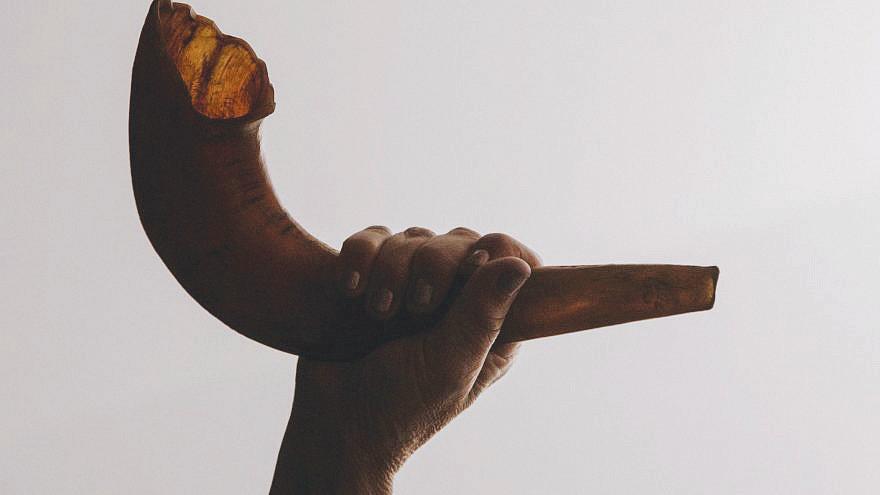
Tydor survived the Holocaust and took the shofar with him to Israel and then America.




His daughter, Judith Tydor BaumelSchwartz, who directs Holocaust research at Bar-Ilan University in Ramat Gan, Israel, spoke at the artifact’s unveiling, saying she was loaning the shofar to show the great lengths that imprisoned Jews went to practice their religion during the Holocaust.
“One thing I know from all the thousands of survivors I interviewed,” she said, “it’s that the impossible was possible, both the bad and the good.” JN


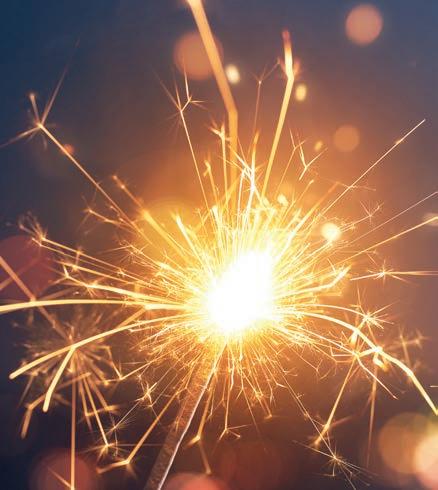
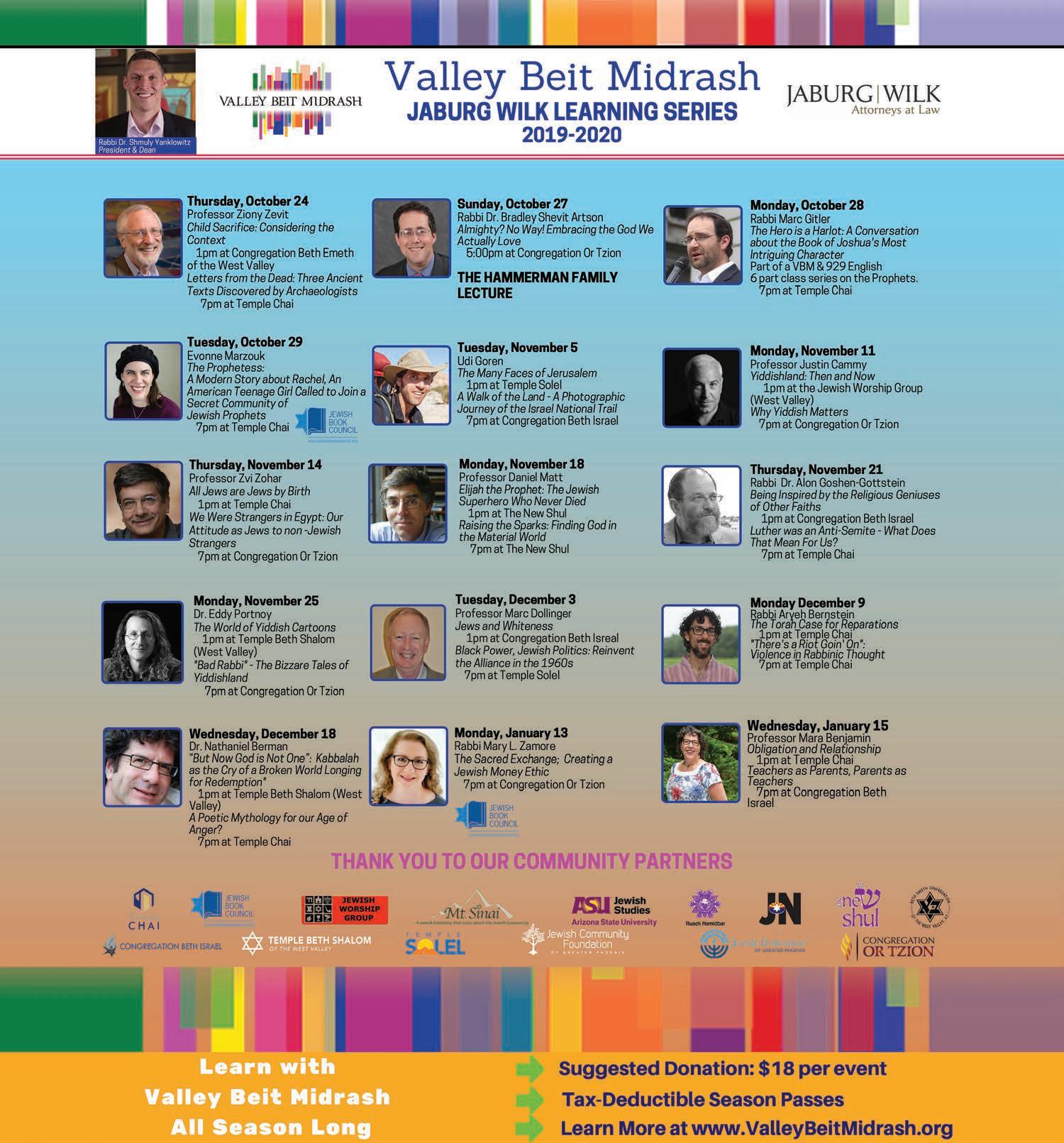

YEARS 20
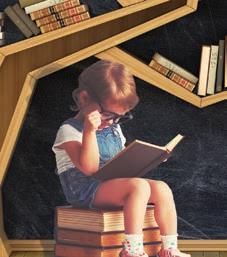


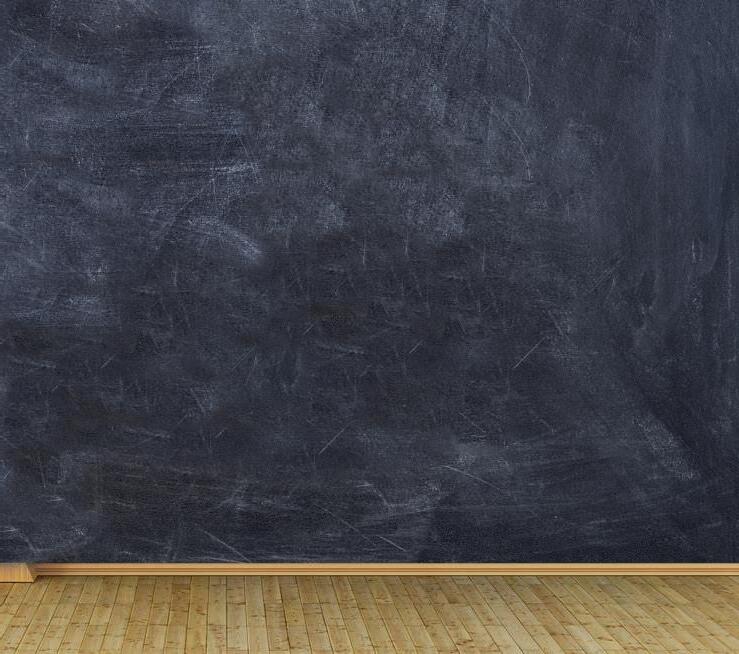
JNS.ORG

Torah took the mound at Citi Field as the Orthodox Union fielded a team of 29 internationally renowned scholars, who led classes on a wide array of 31 subjects for around 2,500 participants, at its third annual Torah New York event last weekend.


The classes ranged from more traditional approaches on how to prepare spiritually for the Jewish High Holidays to more modern issues like repentance in a time of social media and the effects that artificial intelligence will have on Shabbat observance in the future.
bloom.
You don’t need to live at Sagewood to move to our new Desert Willow Assisted Living neighborhood. Resort-style amenities, innovative wellness and personalized care – all for one monthly fee. Call today to hear about our limited-time grand opening incentives.
Desert Willow Assisted Living




480.359.1894


To learn more about Desert Willow, visit Sagewood-SeniorCare-Phoenix.com
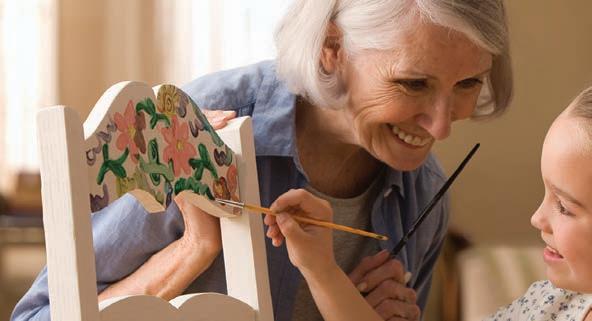
In addition to lectures, the Semichat Chaver Program and siyyum (celebration of the completion of any unit of Torah study, or book of the Mishnah or Talmud) attracted 400 people from 23 North American communities. NCSY teen programming and a parallel interactive program took place for children ages 5 to 12.
unbridled access to social media.
“It is no longer good enough to have Amazon, now you need Amazon Prime. We can’t even wait a week for a package to arrive; it has to be that day or at least the next. What does that say about our culture? This is the crisis of our generation. How do we learn to use social media for the good, but turn it off and away from things that distract us and our children?” she posed.
'WE CAN’T EVEN WAIT A WEEK FOR A PACKAGE TO ARRIVE; IT HAS TO BE THAT DAY OR AT LEAST THE NEXT. WHAT DOES THAT SAY ABOUT OUR CULTURE? THIS IS THE CRISIS OF OUR GENERATION.'
SIVAN RAHAV MEIR, POLITICAL REPORT FOR ISRAEL'S CHANNEL 2
Rabbi Yosef Tzvi Rimon, an internationally acclaimed posek (“decisor”), author, educator and lecturer on helping shape the contemporary Jewish world, welcomed how artificial intelligence could benefit halachic observance in the future. While he cautioned about the impact robots might have on Shabbat in the home, there could be many other benefits that would enhance life for observant Jews in the future.
Also previewed was an app for daily Talmud study called “ALL DAF.”


The app is expected to transform the way Daf Yomi is studied in the future with its interactive statistics, graphs, charts, video, maps and biographies. It is expected to launch with the new seven-year learning cycle that starts in early January 2020.
Sivan Rahav Meir, a political reporter for Israel’s Channel 2, told a packed audience of the dangers of wealth, privilege and
The event also featured a first-ever recording of Rabbi Joseph Soloveitchik teaching one of his famed annual Teshuva Drashas.
“It is so exciting to observe the eagerness of our community to connect to Torah study and to a deeper understanding of their relationship to God,” said Orthodox Union president Moishe Bane. “In these days immediately before the High Holidays, I cannot imagine a more profound message to God of our eagerness to connect.”
Happily ever after: the wish and promise of every marriage — the hopes and dreams of a beautiful future.
For too many couples, it doesn’t happen that way. What is supposed to be love and caring becomes controlling, abusive, demeaning, threatening and dangerous. Nationally, one in four women and one in seven men experience abuse in their lifetime.
Older adults are typically not thought of as possible victims of domestic violence. However, in Arizona, 30% of victims of domestic-violence related deaths are over the age of 50. For an older victim, abuse can intensify existing health issues, injuries can be more severe and recovery time can be longer. In addition to feeling shame, many victims fear not being believed because of their age, and have no place to go.
After a lifetime of isolation and no social support, older adults encounter
unique barriers to escaping abuse. They can have medical issues, impairments to mobility, limited work and credit history, all of which make it especially challenging to identify resources that will help them
lives and what options are available to meet their needs.
Beginning with our mobile advocacy program, referrals can be made to one of our community support groups or our
here to provide support. Resources and information are available through our 24-hour senior help line at 602-264HELP (4357).
October is Domestic Violence Awareness Month and we will be educating the community through presentations about domestic violence against older adults. Area Agency on Aging also participated in the 2019 Lighting Arizona Purple event on Oct. 1 at the Arizona State Capitol, and encourages the community to bring awareness to domestic violence by wearing purple on National Wear Purple Day on Oct. 24.
as they seek safety and self-sufficiency. The Area Agency on Aging DOVES Program provides support and encouragement for late-life survivors of abuse to heal. Through a variety of services, DOVES offers individuals the education to understand what is happening in their
individual counseling service. In addition, our program provides case management, safety planning, court accompaniment and emotional support either by phone or in person.
If someone has made the choice to leave an abusive situation, DOVES is
IN ARIZONA, 30% OF VICTIMS OF DOMESTIC-VIOLENCE RELATED DEATHS ARE OVER THE AGE OF 50. FOR AN OLDER VICTIM, ABUSE CAN INTENSIFY EXISTING HEALTH ISSUES, INJURIES CAN BE MORE SEVERE AND RECOVERY TIME CAN BE LONGER. 7325 E. Princess Blvd. Scottsdale, AZ • 480.447.2381 MaravillaScottsdale.com
If you or someone you know is in a domestic violence situation, there is help and understanding available.
Remember: Domestic violence does not respect age. JN
To be sure, we’re proud of our more than 30 years of experience in senior living. But, to us, what really matters is your experience at our communities. We do everything with that idea clearly in mind. So, go ahead, enjoy yourself with great social opportunities and amenities. Savor fine dining every day. And feel assured that assisted living services are always available if needed. We invite you to experience Maravilla Scottsdale for yourself at a complimentary lunch and tour. Please call 480.447.2381 to schedule.
An Afternoon Soirée Tuesday, October 15th • 2:00pm
You’re invited to an Afternoon Soiree. Enjoy delicious refreshments and appetizers and learn more about the engaging lifestyle and supportive services o ered at Maravilla Scottsdale. To RSVP, please call 480.447.2381.

When you look at a person you assume to be homeless, be it on an off-ramp or sleeping in a doorway, do you know what you’re seeing? Or, more importantly, who you are seeing?
Many people look right past them, preferring not to acknowledge that the issue exists — and, by extension, denying that those who experience homeless exist as well.
Sign up as a volunteer cook or driver at evjcc.org/ladles-of-love
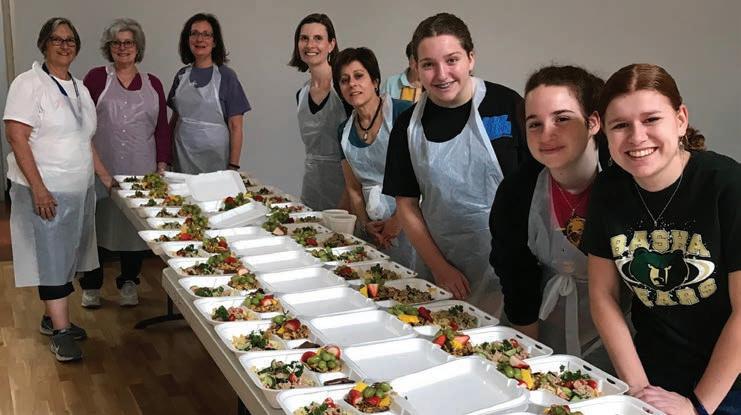
908
•
But the fact is that the men, women and children experiencing homelessness are people with names, faces and histories. And, an increasing number of them are older — old enough to be called seniors.
“There has been a lot of local and national conversation about the aging population experiencing homelessness and what we are seeing on the Human Services Campus,” said HSC Executive Director Amy Schwabenlender. HSC is a 13-acre campus in Phoenix where 15 independent nonprofit agencies collaborate on a range of services designed to help individuals get off the streets and into permanent housing.
“Homelessness is not easy at any age,” Schwabenlender said. “But if you are older, the challenges intensify.”
“If you are unsheltered for any amount of time and if you have health issues, you age faster,” added Dana Kennedy, state director of AARP Arizona. “I think if you look around at the people who are holding signs on street corners, more and more of them appear to be seniors. Being out on the street definitely ages you.”
At the Brian Garcia Welcome Center, the initial entry point for services on the Human Services Campus, 32% of the 6,736 individuals served since July 1, 2018, were 50 or older.
For clients 60 years or older served on the campus, 27% reported the primary reason for their homelessness was economics. More than 14% had been evicted, higher than the 10.5% rate among all HSC clients served during fiscal year 2019, and nearly 14% said relocation problems pushed them onto the streets.
“There are a range of reasons for the elderly to end up without a home,” Schwabenlender said. “Death of a spouse, divorce, health issues and medical
emergencies for people on fixed income or Social Security only begin to scratch the surface.”
For those who may have relocated to Arizona thinking their Social Security checks will go father, “they face increasing rental rates and an eviction system that could force them out of an apartment in 30 days, among other challenges. Elderly people are so much more vulnerable,” Kennedy said.
With a limited number of shelter beds valley wide — the 450 beds at Central Arizona Shelter Services, the state’s largest homeless shelter on the Human Services Campus, are filled nearly every night — and a lack of affordable housing, the availability of shelters and shelter beds specifically for an elderly population is nonexistent.
To address the issue of the challenges faced by the growing number of older Arizonans falling into homelessness and how local organizations are responding, AARP has scheduled a town hall-style discussion at the AARP Aging Networking Breakfast on Wednesday, Oct. 9, at the Beatitudes Campus — Luther Life Center, 1610 W. Glendale Ave. in Phoenix.
There is no charge for the town hall on homeless seniors, which begins at 7:30 a.m., but registration is encouraged. Breakfast will be served and the discussion will end by 9:30 a.m.
The panel, which will be moderated by Kennedy, includes Schwabenlender; Lisa Glow, CEO of Central Arizona Shelter Services; and Wendy Johnson, executive director of the Justa Center, which provides life-sustaining resources, services and support to homeless seniors.
“I don’t think we really know how large the scope of older homelessness is in Arizona as well as nationally,” Kennedy said. “That’s what this town hall will address: the scope of the problem, how organizations are responding and what we can do as individuals to help.” JN
Ladles of Love, a project of the East Valley JCC, delivers kosher meals (and smiles) Valleywide to those in need of a hot meal. It’s a great group mitzvah project!
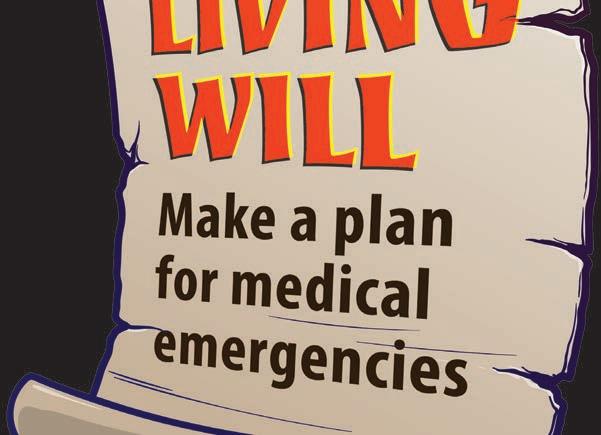 GREG DILL
GREG DILL
Did you know that there are two different ways to receive your Medicare benefits?
The most popular way is Original Medicare. With Original Medicare, you can choose any doctor, hospital or other healthcare provider you want, as long as they accept Medicare. When you receive medical services or goods, Medicare pays the provider directly.
The other way is Medicare Advantage, which is a form of managed care, like an HMO or PPO. Medicare Advantage plans are sold by private insurance companies approved by Medicare. If you’re in Medicare Advantage, you generally must go to doctors and other providers within the company’s network.

On the other hand, Medicare Advantage plans may cover some benefits — such as dental, hearing and vision — that Original Medicare doesn’t.
Most people with Original Medicare pay a monthly premium. Some Medicare Advantage plans charge an additional monthly premium; others don’t.
With Original Medicare, you must pay deductibles and/or coinsurance when you get care.
To cover these “gaps” in Medicare, some people buy supplemental insurance called Medigap. If you have a Medigap policy, Medicare pays its share of the covered costs, and then your Medigap policy pays its share.
Original Medicare generally doesn’t cover prescription drugs. If you want drug coverage, you can purchase a Medicare Part D plan. Like Medicare Advantage, Part D plans are sold by private insurers, which charge a monthly premium for them.
About 70% of Medicare beneficiaries are currently in Original Medicare; the rest get coverage through Medicare Advantage.
Medicare Advantage companies must cover all of the services that Original Medicare covers, except hospice care and some care in qualifying clinical research studies (Original Medicare covers these items even if you’re in a Medicare Advantage plan).
Medicare Advantage plans cover emergency and urgent care, and many


include some prescription drug coverage. But the plans can charge different out-of-pocket amounts and they have different rules for how you get service.
For example, you may need a referral to see a specialist. And you may need to stay in their provider network, unless you’re willing to pay more to go outside the network.
You should always check with the plan before you get a service to find out whether it’s covered and what your costs may be. If the plan decides to stop participating in Medicare, you can join another Medicare health plan or return to Original Medicare.
How can you decide whether Original Medicare or Medicare Advantage is better for you?

There’s a more detailed explanation of the differences between Original Medicare and Medicare Advantage in the “Medicare & You” handbook, which is mailed to all Medicare households every fall. The handbook is also available through our website, Medicare.gov (go to “helpful links” at the bottom of the page).
You can shop for a health or drug plan using the Medicare Plan Finder, also available on the Medicare.gov website. Click on the button that says, “Find health & drug plans” (More about the new, improved Plan Finder in next month’s column).
If you have any questions, you can always call Medicare’s toll-free number, 1-800-MEDICARE (1-800-633-4227). Customer service representatives are available 24/7.

If you’d like to join a Medicare Advantage or Part D drug plan, you can do so during Medicare’s open enrollment period, which runs from Oct. 15 to Dec. 7 each year.
If you’re in Original Medicare and you’re satisfied with it, you don’t need to do anything during open enrollment. But we find that people with Medicare Advantage or Part D plans can often save money by shopping around. JN
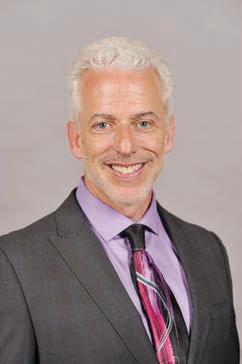

hen I joined my family’s business, Cypress HomeCare Solutions, back in December 2003, I realized very quickly that many of the clients that we were serving had a form of dementia and some had received a diagnosis of Alzheimer’s disease. After 16 years at the helm, I have seen this population base increase to nearly triple our census here at Cypress.
The statistics are overwhelming. The toll of Alzheimer’s disease is reaching epidemic proportions. One in 10 Americans over 65 has Alzheimer’s disease at a cost of $290 billion annually. Someone receives a devastating Alzheimer’s diagnosis every 65 seconds, and over 5.8
WAlzheimer’s than men. The Alzheimer’s Association’s 2019 report suggests that while scientists previously thought the discrepancy was due to women living longer, some researchers think genetics, hormones or lifestyle could lead to a higher incidence of Alzheimer’s among women.
The Alzheimer’s Association found that Alzheimer’s deaths have increased by 145% between 2000 and 2017. A 2014 study discovered that in 2010, nearly 503,400 people who were over 75 died from some form of dementia. This estimate was about five times higher than most predictions.
STATISTICIANS PREDICT THAT IN THE NEXT 30 YEARS, OVER 14 MILLION PEOPLE MAY BE LIVING WITH ALZHEIMER’S DISEASE WITH THE COST OF CARE EXCEEDING $1.1 TRILLION A YEAR
IF RESEARCHERS AREN’T ABLE TO FIND A CURE OR METHOD OF PREVENTION.

million Americans have Alzheimer’s disease. Statisticians predict that in the next 30 years, over 14 million people may be living with Alzheimer’s disease with the cost of care exceeding $1.1 trillion a year if researchers aren’t able to find a cure or method of prevention.
Currently, Alzheimer’s is the sixth leading cause of death in the United States; in the United Kingdom, dementia and Alzheimer’s is the leading cause of death — recently pushing heart disease into second place. This finding comes from the Northern Ireland Statistics and Research Agency and the Office for National Statistics.
Alzheimer’s is often referred to as a “woman’s disease.” Recent facts show that two-thirds of all Alzheimer’s cases are in women. Researchers are still investigating why women are more likely to develop
The obvious question is, what can we do to prevent dementia and or Alzheimer’s? The World Health Organization recently reported that moderate cardiovascular exercise, diet, quitting smoking, drinking in moderate amounts (or eliminating alcohol altogether) and avoiding social isolation can all cut your dementia risk.

This overload of very discouraging data can be overwhelming and give people the sense that the future is somewhat bleak. But the question should be, what can I do?
So, here is what I have done.
From the time I started, I knew I wanted to make a difference. In early 2004, I volunteered to serve as the Memory Walk co-chair for the Alzheimer’s Association. I proudly served in this capacity for four years and met some amazing people and families. Shortly after my fourth tour of duty as co-chair for this marquee event (during this time we increased the attendance four-fold and donations
Let your dreams stay BIG and your worries stay SMALL.
nearly 10 times), I discovered the Banner Alzheimer’s Institute. I immediately fell in love with their mission and served on their board of directors for nearly 10 years, stepping off the board in late 2017. The work that they are doing at Banner is nothing short of phenomenal. BAI is helping to lead the fight against Alzheimer’s through its cutting-edge studies in detection, treatment and prevention and through a comprehensive model of care that addresses both medical and non-medical needs of patients and their families.
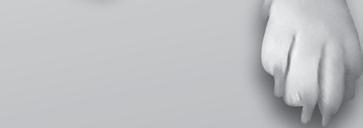


A few years back, BAI created the Alzheimer’s Prevention Registry in collaboration with partnering organizations as part of its mission to end Alzheimer’s without losing another generation. The Phoenix-based nonprofit organization is part of Banner Health, one of the largest nonprofit health care systems in the country.



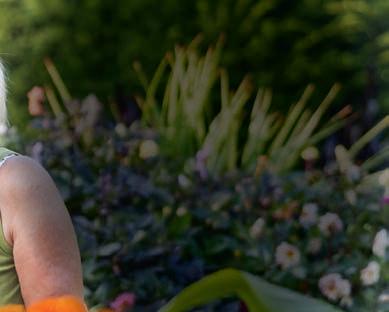
As an engaged community of individuals and organizations united by this cause, the Registry is an online resource for those who want to stay abreast of the latest in Alzheimer’s news, scientific advances and overall brain health. In turn, Registry members become informed advocates for Alzheimer’s prevention.
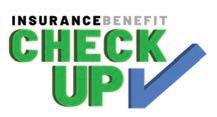
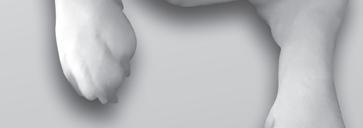







To date, the Registry has enrolled 346,301 people age 18+, with or without a family history of Alzheimer’s, and also supports participation in a variety of community-based Alzheimer’s prevention studies and gives members the opportunity to have a direct impact on the future of Alzheimer’s. “Studies often need to screen 10 to 15 times the number of people needed to enroll because most
trials require specific criteria for participation. This Registry allows us to get to the answers faster,” said Dr. Jessica Langbaum, principal scientist at BAI and associate director of the Alzheimer’s Prevention Initiative.
While participation in research studies is optional, the Registry is the best effort to bring together those who share the belief that now is the time to end Alzheimer’s. It leverages the collective strengths of esteemed researchers and organizations and harnesses the power of a public willing to participate in the study process and make a meaningful difference in the fight against Alzheimer’s.
“Only by working together can we find ways to prevent Alzheimer’s before we lose another generation,” said Dr. Eric M. Reiman, CEO of Banner Research and executive director of BAI.

Planning for the future is paramount, and as a community we will need to pull together if we are going to ever eradicate our world of this horrible disease. That means in the research community and in all communities across our globe.
Now it is time to act. When you have individuals who are united by a cause that is for the greater good of mankind, great things can happen. Come and join me in this movement to end Alzheimer’s.
Sign up for the Alzheimer’s Prevention Registry and make the difference in the lives of our future generations. It may take a village to raise a child; but in order for us to find a cure, it will take every bit of our village and many others, too. JN


Israeli Movie Series: 3 p.m., East Valley JCC, 908 N. Alma School Road, Chandler. “Song of Ascension,” a documentary about the relationship between a couple and the surrogate who has their baby. A $5 donation suggested. Register: evjcc.org/ movie-series

SATURDAY, OCT. 26
Night of the Living Will: By appointment only, central Phoenix. The Area Agency on Aging and the Elder Law, Mental Health and Special Needs Planning Section of the State Bar of Arizona are partnering to provide individuals with a free consultation to develop their living will and healthcare power of attorney. Once an appointment is scheduled, an address will be provided. Call the 24-hour Senior Help Line at 602264-4357 to schedule an appointment.
Maricopa Music Fest, LLC: 1-7 p.m., The Copper Sky Recreation Multigenerational Center, 44345 M.L.K. Jr. Blvd., Maricopa. Partnered in part by: Amazon, Honda and Little Caesars Pizza. The public will be able enjoy a free Motown Impersonation Show, compete in a lip sync contest, play laser tag, game trucks and corn tossing with a half-time skateboard competition. Maricopa Mayor Christian Price will take the stage to receive scholarship funds from Amazon and more. Visit maricopamusicfest.us/battle-ofthe-bands-info?olsPage=products for more information.
THURSDAY, NOV. 14
BRCA education and screening event: Hosted by the Minkoff Center for Jewish Genetics. The screening event is designed to be an educational session led by cancer genetic counselors from the Phoenix community. Prior to undergoing genetic testing, individuals attending the education session will have the opportunity to learn more details about hereditary breast and ovarian cancer and the implications of undergoing genetic testing. Go to jewishgeneticsaz.org/calendar for more information or to RSVP.
AJHS Heritage Award Dinner: 6 p.m., Monterra at Westworld, 16601 N. Pima Road, Scottsdale. The Arizona Jewish Historical Society will honor Marnie and Harvey Dietrich with the 2019 Jerry Lewkowitz Heritage Award, which is presented to individuals who have made an exceptional impact on the community through outstanding leadership, service and dedication. In keeping with the evening’s western theme, entertainment includes cowboy poet, singer, songwriter
and storyteller Red Steagall and the DEO Entertainment Group. Tickets are $200 per person. Call 602-241-7870 or visit azjhs.org for information and reservations.
MONDAYS
Mahjong Mondays: 10 a.m.-12:30 p.m., East Valley JCC, 908 N. Alma School Road, Chandler. Every Monday, except on Jewish or legal holidays. You are invited to come and play, no RSVP is necessary, just come. This free program is intended for players with prior experience. Be sure to bring your current mahjong card and a set if you have one. evjcc.org or 480-897-0588
WEDNESDAYS
‘The Valley News’: 10-11:30 a.m., Valley of the Sun JCC, 12701 N. Scottsdale Road, Scottsdale. The class focuses on current events and is led by Dr. Michael Epner. No registration required.
THIRD SUNDAY OF EVERY MONTH
Jewish War Veterans: 10 a.m., Arizona State Veterans Home, 4141 N. S. Herrera Way, Phoenix. Scottsdale Post 210 welcomes all Jewish veterans to its monthly meetings. Due to Sukkot the October meeting will be on the 27th. Refreshments served at 9:30 a.m. Call 602-256-0658 for more information.
SUNDAY, OCT. 6
Ladles of Love: 9 a.m.-noon, East Valley JCC, 908 N. Alma School Road, Chandler. Volunteers cook and deliver meals. Register: evjcc.org/ladles-of-love
BJE’s Jewish Marriage University: 9:30 a.m.12:30 p.m., Valley of the Sun JCC, classroom 101, 12701 N. Scottsdale Road, Scottsdale. Learn ways to enhance one’s relationship including communication and conflict resolution skills, planning for one’s financial future, how Judaism can help build strong relationships and marriages, along with many other topics. $45 per couple. Register at bjephoenix.org. Email Linda Feldman at lindaf@bjephoenix.org for more information.
Valley Jewish Singles Ages 50+ brunch: Noon, Chompies PV Mall, 4550-324 E. Cactus Road, Phoenix. Reservations required; email valleyjewishsingles@cox.net to RSVP.
Rally for asylum seekers: 12:30-1:30 p.m., Senator McSally’s office, 2201 E. Camelback Road, Phoenix. Hosted by AZ Jews for Justice. RSVP to EddieAZJews4Justice@ gmail.com.
THURSDAY, OCT. 10
Open Beit Midrash class: 9 a.m., East Valley JCC, 908 N. Alma School Road, Chandler. The Life and Tragedy of King David, taught by Rabbi Michael Beyo. Free, but registration required: evjcc.org/open-beit-midrash
Talmudic Heroes: 10 a.m., East Valley JCC, 908 N. Alma School Road, Chandler. Taught by Rabbi Michael Beyo. Cost: $14. Registration required: evjcc.org/ open-beit-midrash
Speaker Series: 11 a.m., East Valley JCC, 908 N. Alma School Road, Chandler. Speaker: Jake Bennett. Topic: “Disputed Territory of Jerusalem: What’s it all about?” Cost: $14, includes kosher lunch. Registration required: evjcc.org/open-beit-midrash
Evening with Arizona Jews for Justice: 5-7 p.m., Temple Chai, 4645 E. Marilyn Road, Phoenix. Coffee and a community talk. Topic: “How can we start to make a difference in our communities?” RSVP to EddieAZJews4Justice@gmail.com.
SUNDAY, OCT. 13
Yoga to Awaken Inner Joy: 11:35 a.m.1:25 p.m., Valley of the Sun JCC, 12701 N. Scottsdale Road, Scottsdale. An all-levels yoga workshop also occurring on Nov. 17. Instructor: Amy Tyre. This workshop is for anyone who wants to feel more joy, hope, energy and happiness. It is specifically designed to help alleviate the symptoms of stress-related disorders, including anxiety and depression. Participants may attend one workshop or select both dates. Childcare is available. $25 for members, $33 for guests. Contact the JCC at 480-481-7018 or healthandfitness@vosjcc.org to register.
WEDNESDAY, OCT. 16
Sites and Symbols: The History of Auschwitz and the Anne Frank House: 11 a.m., Generations After Descendants Forum at the East Valley JCC, 908 N. Alma School Road, Chandler. Speaker: Professor Kimberly Allar, Ph.D., from ASU’s School of History, Philosophy and Religious Studies and codirector of the school’s online World War II Studies master’s degree program. Free. Reservations: 480-897-0588 or evjcc.org/ generations-after.
Book discussion group: 7 p.m., CutlerPlotkin Jewish Heritage Center, 122 E. Culver St., Phoenix. Topic: “Spies of No Country: Secret Lives at the Birth of Israel” by Matti Friedman. Discussion led by AZJHS Vice President, Mark Sendrow, M.A. Free. Please RSVP to lbell@azjhs.org or call 602-2417870.
WEDNESDAY, OCT. 23
BJE’s Jewish Marriage University: 6:308:30 p.m., Valley of the Sun JCC, 12701 N. Scottsdale Road, Scottsdale. Extra session for interfaith couples. Learn ways to enhance one’s relationship including communication and conflict resolution skills, planning for one’s financial future, how Judaism can help
build strong relationships and marriages, along with many other topics. $45 per couple. Register at bjephoenix.org. Email Linda Feldman at lindaf@bjephoenix.org for more information.
THURSDAY, OCT. 24
Open Beit Midrash class: 9 a.m., East Valley JCC, 908 N. Alma School Road, Chandler. The Life and Tragedy of King David, taught by Rabbi Michael Beyo. Free, but registration required: evjcc.org/open-beit-midrash
Talmudic Heroes: 10 a.m., East Valley JCC, 908 N. Alma School Road, Chandler. Taught by Rabbi Michael Beyo. Cost: $14. Registration required: evjcc.org/ open-beit-midrash
Speaker Series: 11 a.m., East Valley JCC, 908 N. Alma School Road, Chandler. Pastor Rock Fremont of Shepherd of the Hills UCC discusses how religion drives social action and the challenges facing the church community. Cost: $14, includes kosher lunch. Registration required: evjcc.org/ open-beit-midrash
Child Sacrifice: Considering the Context: 1-2 p.m., Beth Emeth Congregation of the West Valley, 13702 W. Meeker Blvd., Sun City West. Speaker: Professor Ziony Zevit. Suggested donation: $18. Register at VBMTorah.org.
Letters from the Dead: Three Ancient Texts Discovered by Archaeologists : 7-8:30 p.m., Temple Chai, 4645 E. Marilyn Road, Phoenix. Speaker: Professor Ziony Zevit. Suggested donation: $18. Register at VBMTorah.org.
SUNDAY, OCT. 27
The Hammerman Family Lecture –Almighty? No Way! Embracing the God We Actually Love: 5-6:30 p.m., Congregation Or Tzion, 16415 N. 90th St., Scottsdale. Speaker: Rabbi Dr. Bradley Shavit Artson. Suggested donation: $18. Register at VBMTorah.org.
MONDAY, OCT. 28
Cactus ORT: 7 p.m., Mountain Gate Apartments Clubhouse, 4602 E. Paradise Village Parkway N., Phoenix. Paul Rockower, executive director of the Jewish Community Relations Council will discuss Jewish communal public diplomacy. Prospective members, current members and the public are welcome to attend this free event. Refreshments provided. To RSVP or for more information, call Ellen at 602-953-9302.
The Hero is a Harlot: A Conversation about The Book of Joshua’s Most Intriguing Character: 7-8:30 p.m., Temple Chai, 4645 E. Marilyn Road, Phoenix. Suggested donation: $18. Register at VBMTorah.org.
THURSDAY, OCT. 31
Open Beit Midrash class: 9 a.m., East Valley JCC, 908 N. Alma School Road, Chandler. The Life and Tragedy of King David, taught by Rabbi Michael Beyo. Free, but registration required: evjcc.org/open-beit-midrash
Talmudic Heroes: 10 a.m., East Valley JCC, 908 N. Alma School Road, Chandler. Taught by Rabbi Michael Beyo. Cost: $14. Registration required: evjcc.org/ open-beit-midrash
Speaker Series: 11 a.m., East Valley JCC, 908 N. Alma School Road, Chandler.
Speaker: Rabbi Shimi Ash. Topic: Is plastic surgery allowed? Cost: $14, includes kosher lunch. Registration required: evjcc.org/ open-beit-midrash
WEDNESDAY, NOV. 13
Taste of LimmudAZ: 6-9 p.m., Temple Solel, 6805 E. McDonald Drive, Paradise Valley.
Special Guest: Christopher Noxon, author of “Good Trouble, Lessons of the Civil Rights Playbook.” Presentations available before keynote event. $18 for general admission, $54 for VIP experience. The VIP pre-tasting includes appetizers, wine, program and dessert reception along with a copy of “Good Trouble.” For more information or to RVSP, visit limmudaz.org/limmud-az-event/ taste-of-limmud.
SUNDAY, NOV. 17
BJE’s Jewish Marriage University: 9:30 a.m.12:30 p.m., Valley of the Sun JCC, classroom 101, 12701 N. Scottsdale Road, Scottsdale. Learn ways to enhance one’s relationship including communication and conflict resolution skills, planning for one’s financial future, how Judaism can help build strong relationships and marriages, along with many other topics. $45 per couple. Register at bjephoenix.org. Email Linda Feldman at lindaf@bjephoenix.org for more information.

Yoga to Awaken Inner Joy: 11:35 a.m.1:25 p.m., Valley of the Sun JCC, 12701 N. Scottsdale Road, Scottsdale. An all-levels yoga workshop. Instructor: Amy Tyre. This workshop is for anyone who wants to feel more joy, hope, energy and happiness. It is specifically designed to help alleviate the symptoms of stress-related disorders, including anxiety and depression. Childcare is available. $25 for members, $33 for guests. Contact the JCC at 480-481-7018 or healthandfitness@vosjcc.org to register.
THURSDAY, NOV. 21
Book discussion group: 7 p.m., CutlerPlotkin Jewish Heritage Center, 122 E. Culver St., Phoenix. Topic: “Rachel’s Tomb” by J.A. Bernstein. Discussion led by Michael and Jennie Kronenfeld, Ph.D. Free. Please RSVP to lbell@azjhs.org or call 602-241-7870.
MONDAYS
Free baby gym classes: 9:30-10 a.m., Arizona Sunrays Gymnastics & Dance Center, 15801 N. 32nd Street, Phoenix. Parents (and grandparents) are invited to bring in their babies, ages 6 months to 18 months. This parent-child class uses tumbling mats, balance beams, parallel bars and trampolines. Work on strength, balancing and coordination with your baby. This is a “drop in” class. Advanced registration is not required. Call 602-992-5790 or visit arizonasunrays.com for more information.
Breakfast Babies: 9-10:30 a.m., The Brunch Café, 15507 N. Scottsdale Road, Suite 100, Scottsdale. A fun-filled morning gathering for parents and grandparents with babies or toddlers. Complimentary coffee and a chocolate-covered strawberry with the
purchase of any meal. Includes a story time picture book reading. Call 480-398-7174 or visit brunchcafe.com for more information.
WEDNESDAYS
Free baby dance classes: 9:15-9:45 a.m., Arizona Sunrays Gymnastics & Dance Center, 15801 N. 32nd Street, Phoenix. For babies who are walking up to age 2 ½. This baby dance class is a fun introduction to music, movement and dancing. Babies will dance to the music while using all kinds of different props and toys. Parent/grandparent participation is required. This is a “drop in” class. Advanced registration is not required. Call 602-992-5790 or visit arizonasunrays. com for more information.
Shabbat
FIRST SATURDAY OF EACH MONTH
Kavana Café: 8:45 a.m., Congregation Or Tzion, 16415 N. 90th St., Scottsdale. This is an informal opportunity to learn with Rabbi Micah Caplan prior to Saturday-morning services. A light breakfast will be served. For more information, visit congregationortzion. org or call 480-342-8858.
EVERY SATURDAY
Torah Express: Noon, Congregation
Or Tzion, 16415 N. 90th St., Scottsdale. On Shabbat mornings, during the congregation’s Kiddush lunch, join Rabbi Micah Caplan and other Jewish professionals and teachers from the community for an in-depth study of the Torah portion of the week. No RSVP required. For more information, visit congregationortzion.org or call 480-342-8858.
THURSDAY, OCT. 17
The Palazzo grand opening: 4:30-8:30 p.m., 6250 N. 19th Ave., Phoenix. The Palazzo senior living community celebrates its grand opening with a cruise-ship themed event. Enjoy worldly destinations throughout the grounds and enter for a chance to win a cruise or other prizes.
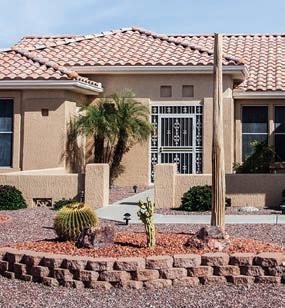
SUNDAY, OCT. 27
‘Robbery of the Heart’: 2-3:30 p.m., Civic Center Library, 3839 N. Drinkwater Blvd., Scottsdale. This documentary delves into the story of Kristallnacht from the point of view of Holocaust survivors and German citizens.
Q&A with producer Micah Brandt and Rabbi Micah Caplan following the film. Contact Pat Toftoy at ptoftoy@scottsdaleaz.gov or 480312-2180 for more information.
WEDNESDAY, OCT. 30
‘Robbery of the Heart’: 5:30-7 p.m., Scottsdale Appaloosa Library, 7377 E. Silverstone Drive, Scottsdale. This documentary delves into the story of Kristallnacht from the point of view of Holocaust survivors and German citizens.
Q&A with producer Micah Brandt following the film. Contact Pat Toftoy at ptoftoy@ scottsdaleaz.gov or 480-312-2180 for more information. JN
Parents are making decisions for next summer and next year now! Showcase your offerings to Jewish News readers.

Temple Solel of Paradise Valley’s Caring Community brings love to the Valley this New Year by making matzah ball soup and Rosh Hashanah gift bags for members in need.
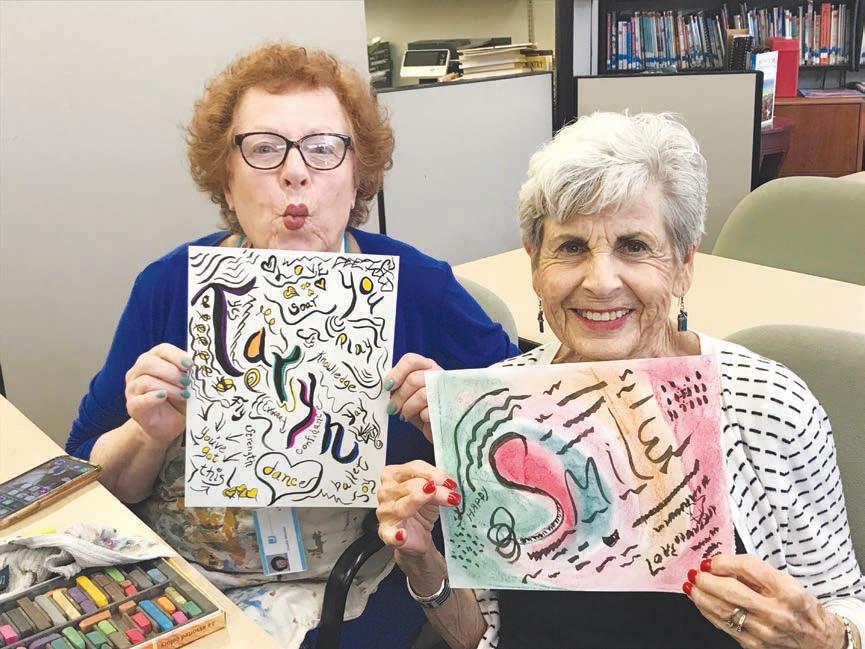

More than 400 students march in a parade to promote ADL Arizona’s “No Place For Hate” initiative at Chase Field on Sept. 18.
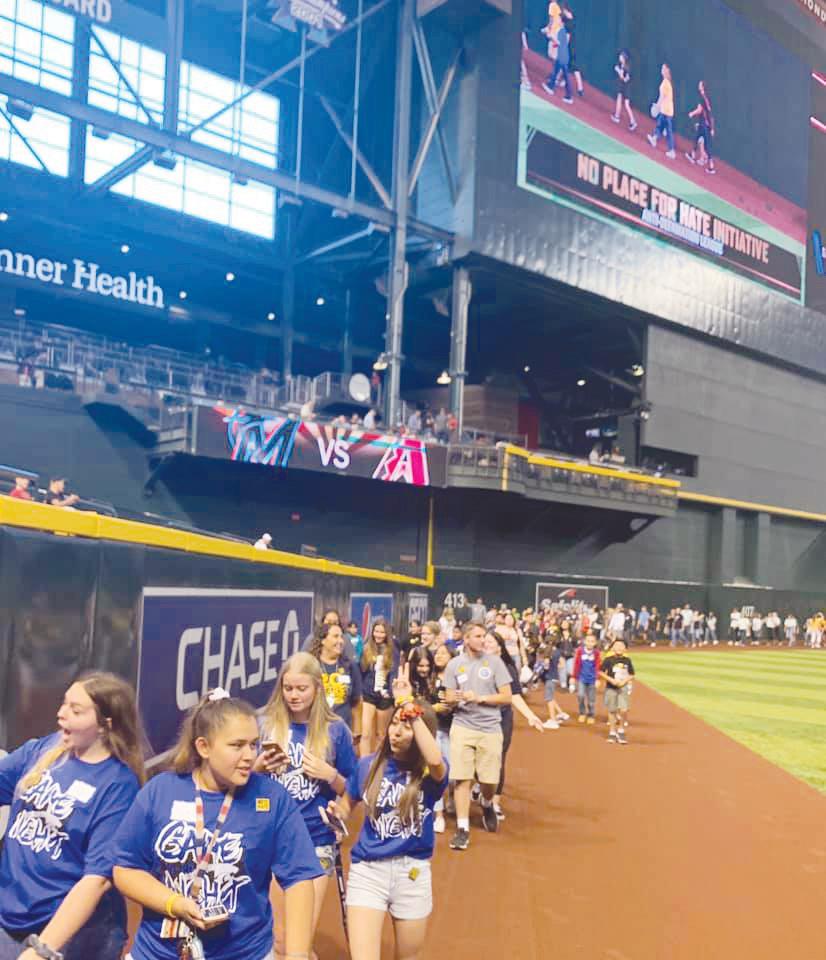
Artist Tal Dvir, who is originally from Israel, explains the process of painting with watercolors at a recent Arts & Culture program at the East Valley JCC. He is currently teaching a painting class at the EVJCC and his work is on display in the EVJCC’s lounge.
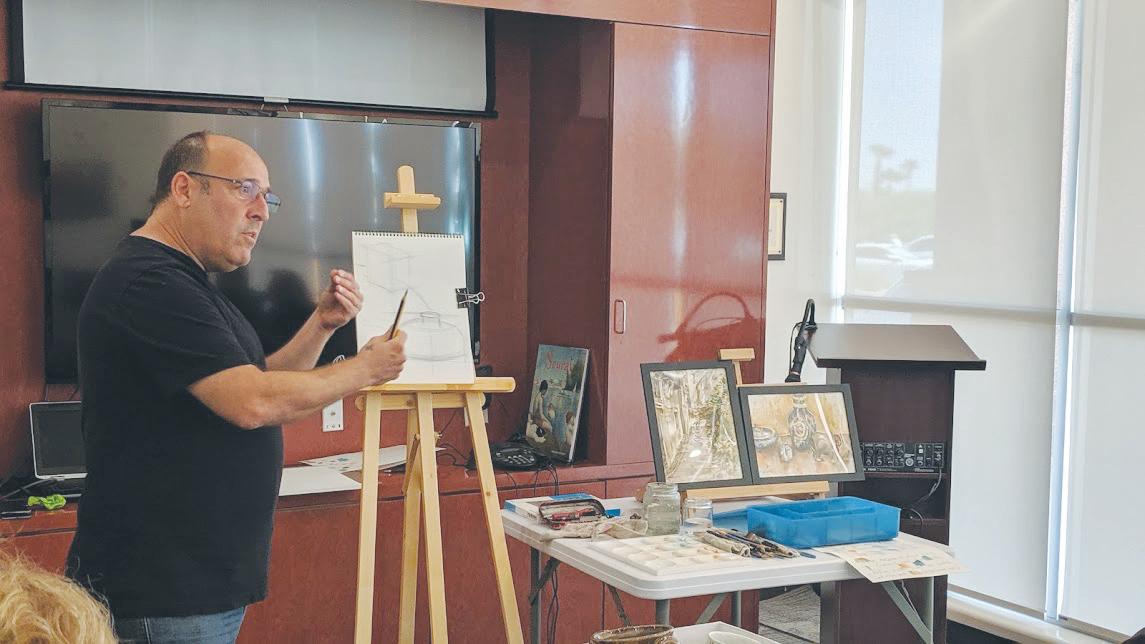
PJ Library of Greater Phoenix holds its “Rosh Hashanah Around Arizona” program at Scottsdale’s Railroad Park on Sept. 22.

Learning offerings at the
one
This COMMUNITY page features photos of community members around the Valley and the world. Submit photos and details each week to photos@jewishaz.com by 10 a.m. Monday.
Harmony Idira Pollack was born in June 2018 in Scottsdale. She is the daughter of Helene Diamond-Pollack of Phoenix and Russell Pollack of Brooklyn, New York. Harmony has one sibling, Rebecca Pollack.
BAT MITZVAH
MAYA ARIEL BUCHWALD
Maya Ariel Buchwald becomes a bat mitzvah on Oct. 19, 2019, at Temple Chai. She is the daughter of Lauren and Mathew Buchwald of Paradise Valley.
Grandparents are Carol Rose of Scottsdale and Marc Kippelman (Wendy) of Bloomfield Hills, Michigan; and Linda and Dr. Robert of Buchwald of Scottsdale.
For her mitzvah project, Maya volunteered over 13 hours at her favorite nonprofit organization, Feed My Starving Children. She brought friends and family to packing sessions to help bring children around the world healthy meals. Maya also connected with Remember Us, an organization that remembers children who died in the Holocaust. Maya will honor the memory of Herta Buchwald, who died as a child in the Lublin Ghetto before she could become a bat mitzvah.
A student at Cocopah Middle School, Maya is a competitive tennis player and loves to ski. She is a member of the National Charity League, a mother-and-daughter philanthropic organization. Maya also attends Camp Stein, and participates in NFTY events. JN

Donald Lehrer passed away peacefully at the age of 80 on Sept. 22, 2019, at Rock Creek Memory Facility in Surprise, Arizona.



Donald is survived by his wife, Irene; his daughter, Marci Alter, and her husband, Jonathan; his son, Richard Lehrer, and his wife, Nadine; and his grandchildren, Jordan, Zachary, Jarrad and Allison.




Donald was born on Dec. 10, 1938, in the Bronx, New York, to Douglas and Lillian Lehrer. He graduated from Westchester Community College in 1958 with an associate degree in electrical engineering. After serving in the Army, he married Irene in 1961.
Donald was an accomplished engineer, businessman, ceramic artist, racquetball player, swimmer, weightlifter, pickle-maker and father.
In lieu of flowers, please send donations to the 92nd Street Y, the Lewy Body Dementia Association and/or the American Heart Association.

$3,000! ($5,000 value)
A beautiful location near a tree in the Jewish Section at Green Acres, Scottsdale. Can be used for dbl occupancy. Lot 116 Space 3. Contact Harry Kulwin (925)
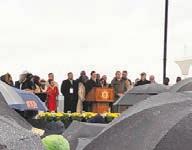


Make a charitable donation to Jewish News and help support Jewish community journalism.


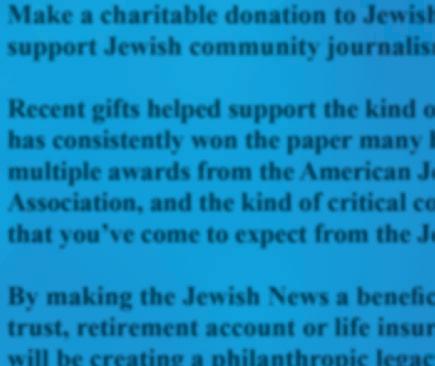



Recent gifts helped support the kind of reporting that has consistently won the paper many honors, including multiple awards from the American Jewish Press Association, and the kind of critical community coverage that you’ve come to expect from the Jewish News.
By making the Jewish News a beneficiary of your will, trust, retirement account or life insurance policy, you will be creating a philanthropic legacy that will help sustain the vibrant voice of Jewish Arizona. Whether you read us in print or online, please help us continue our commitment to bringing you the local Jewish news our community counts on.

Contributions to the Jewish News, a 501(c)(3) organization, are tax deductible. Seek independent professional legal advice before making any change to your plans.


JANET PEREZ | MANAGING EDITOR
It’s become a depressingly familiar rite that parents must go through with their children every time there is a mass shooting. But for Jewish parents, the massacre at a synagogue in Pittsburgh has burned with the anguish of thousands of years. Children have heard and talked about shootings in schools and malls, but talking about a shooting


Arizona’s problem is not as big, but still has an impact on prisoners and visitors. But that has not stopped the Aleph Institute from providing its services.

Please subscribe and continue to support JEWISH NEWS with a tax-deductible contribution. Complete the form below or go to jewishaz.com/subplus

Please mail the completeted form with payment to


12701 N. Scottsdale Road, Suite 206 Scottsdale, AZ 85254

Jewish organizations keep prisoners from being forgotten